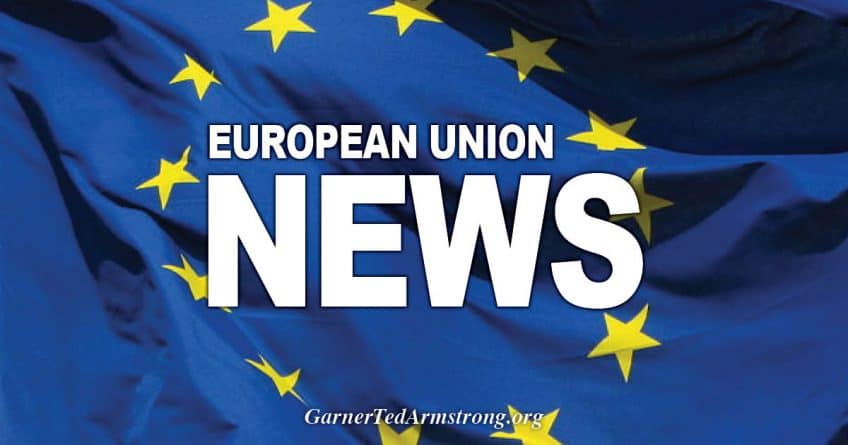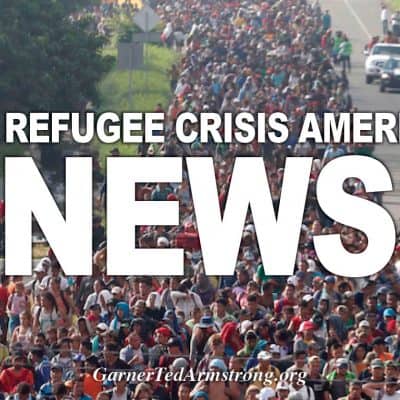
The recent wave of European withdrawals was triggered by conservative Austrian Chancellor Sebastian Kurz, who renounced the pact at the end of October | Sean Gallup/Getty Images
Populists seize chance to put favorite issue on agenda ahead of EU vote, causing ructions among governments.
A previously obscure 34-page, jargon-filled document is causing political convulsions across Europe — even though it’s not even legally binding.
Italy this week became the latest in a string of European countries to say it would not sign the U.N.’s Global Compact on Migration at a ceremony in Marrakech in just under two weeks. From the Netherlands through Belgium and Germany to Slovakia, the pact has triggered infighting in ruling parties and governments, with at least one administration close to breaking point.
The fight over the pact illuminates how migration remains a combustible issue across the Continent, three years after the 2015 refugee crisis and with next May’s European Parliament election on the horizon. Far-right parties keen to make migration the key campaign issue have seized on the pact while some mainstream parties have sought to steal their thunder by turning against the agreement. Liberals and centrists, meanwhile, have found themselves on the defensive — arguing that the agreement poses no harm and migration is best handled through international cooperation.
Louise Arbour, the senior U.N. official overseeing the pact, said she is surprised by the controversy, as diplomats from 180 countries — including many that have now pulled out — signed off on the text last summer after two years of negotiations.
The initiative was launched at the request of Europe after the migration surge of 2015, Arbour said. The countries now having “second thoughts or misgivings” were very active during the negotiations and “extracted compromises from the others,” she told POLITICO in an interview.
Arbour, a former Canadian judge and U.N. human rights commissioner, said the recent backtracking illustrates a clear “disconnect” between some countries’ foreign policies “and domestic pressures or national concerns that were not included into the process.”
She stressed the compact is not binding and, after its formal adoption next month, “there is not a single member state that is obligated to do anything that it doesn’t want to.”
The Global Compact for Safe, Orderly and Regular Migration, to give it its full name, sets out a “cooperative framework” for dealing with international migration. Signatories agree, for example, to limit the pressure on countries with many migrants and to promote the self-reliance of newcomers. The document states that no country can address migration alone, while also upholding “the sovereignty of States and their obligations under international law.”
That assurance has not been enough to placate many in Europe. Hungary, whose Prime Minister Viktor Orbán has made anti-migrant policies his signature issue, pulled out while the pact was being negotiated. But the recent wave of European withdrawals was triggered by conservative Austrian Chancellor Sebastian Kurz, who renounced the pact at the end of October.

German Interior Minister Horst Seehofer (left), Austrian Chancellor Sebastian Kurz (center) and his coalition partner Heinz-Christian Strache (right) meet in Vienna to discuss immigration, July 2018 | Michael Gruber/Getty Images
Heinz-Christian Strache, the leader of the far-right Freedom Party, Kurz’s coalition partner, declared that “Austria must remain sovereign on migration” and said the country is “playing a leading role in Europe.” At least in terms of the pact, that turned out to be true with Bulgaria, the Czech Republic, Poland, Estonia, Croatia and Switzerland all following Vienna’s lead.
Bratislava, Berlin and beyond
Slovakia is among the most recent countries to withdraw its support for the pact. After an EU summit on Sunday, Prime Minister Peter Pellegrini said Bratislava would not support the pact “under any circumstances and will not agree with it.”
Foreign Minister Miroslav Lajčák on Thursday said he would resign after parliament decided to reject the pact. Lajčák was president of the U.N. General Assembly when the migration pact was adopted.
Populist parties in other countries have forced the pact to the top of the political agenda. The Dutch government under Prime Minister Mark Rutte has come under pressure from far-right leaders, including Geert Wilders and Thierry Baudet, who refers to the agreement as the “U.N. Immigration Pact.” The government ordered a legal analysis of the text last week to ensure that signing it will not entail any legal consequences. The Cabinet finally decided on Thursday that it would support the pact, but would add an extra declaration, a so-called explanation of position, to prevent unintended legal consequences.
In Germany, the pact has become an issue in the battle to succeed Angela Merkel — the EU politician most associated with a more liberal approach to migration — as leader of the ruling Christian Democratic Union (CDU). Two of the leading contenders for the post, Jens Spahn and Friedrich Merz, have both criticized the agreement and called for it to be amended.
The German chancellor mounted a spirited defense of the pact, telling the Bundestag last week that the agreement is in Germany’s national interest as it will encourage better conditions for refugees and migrants elsewhere in the world.
Arbour argued that although the pact is not legally binding, it is still worthwhile. “The pact is a major cooperation project … a political initiative to align initiatives for the common benefit,” she said.
But such arguments cut little ice with the WerteUnion (“Union of Values”), a group of thousands of conservative members of the CDU and its Bavarian sister party. It takes issue with multiple sections of the pact, such as a declaration that migrants “regardless of their status, can exercise their human rights through safe access to basic services.” The group argues that as German social benefits are high, such a commitment would encourage migrants to come to Germany.

Michel has been consulting with a handful of European countries to produce a joint statement to be attached to the pact | Leon Neal/Getty Images
In Belgium, the pact has put liberal Prime Minister Charles Michel’s coalition government at risk. The Flemish nationalist N-VA, the biggest party in government, has demanded Belgium withdraw from the agreement. Michel is caught between his commitment to the pact and his coalition partner’s rejection of it — while seeking to fend off a Francophone opposition that will take any opportunity to portray him as a puppet of the Flemish nationalists ahead of federal, regional and European elections next May.
Searching for a way to keep his government afloat, Michel has been consulting with a handful of European countries including Denmark, Estonia, the U.K. and Norway, to produce a joint statement to be attached to the pact, according to Belgian media. Another idea is for several of those countries to join the Netherlands in signing a common “explanation of position,” Dutch newspaper De Volkskrant reported.
Arbour said it’s too late to start making changes to the pact itself. Renegotiating the text or attaching an extra statement is “not what other [countries] have signed up to,” she said.
[Disclaimer]









